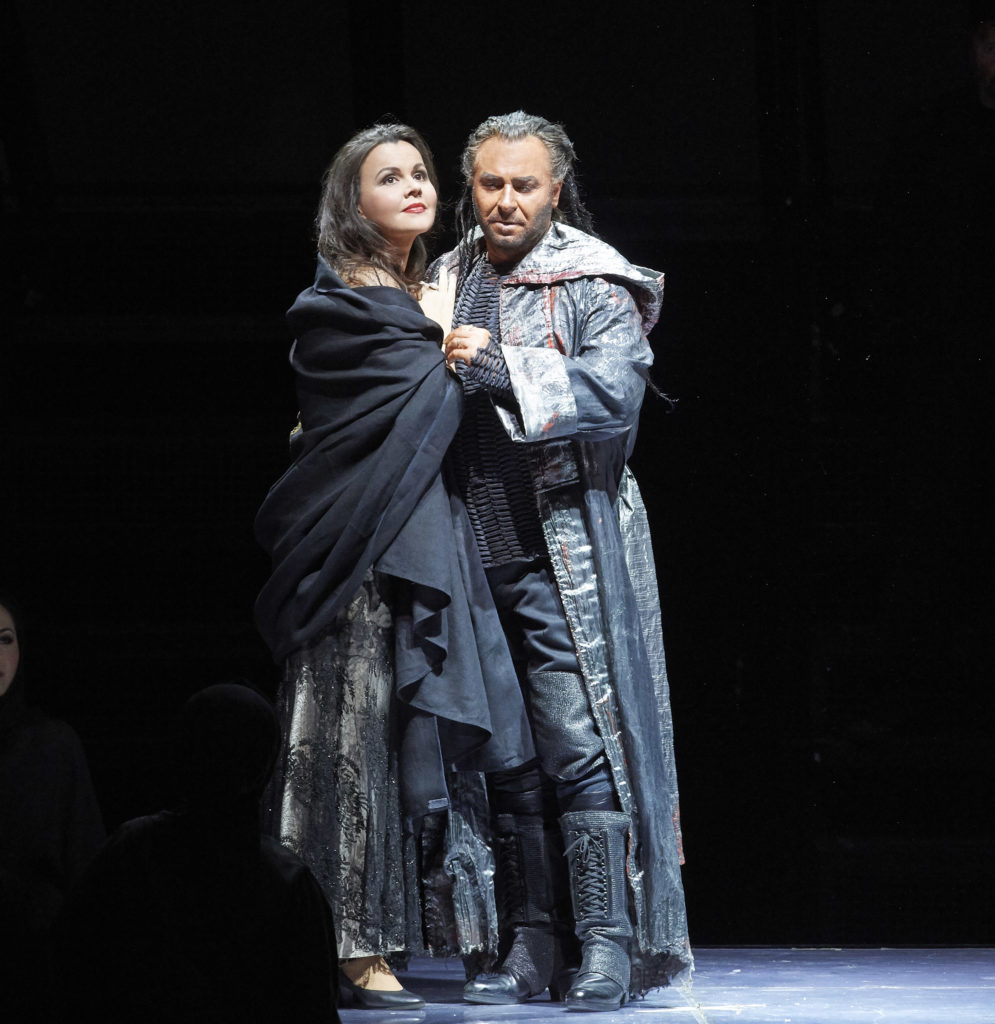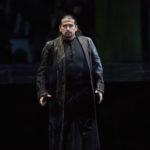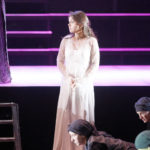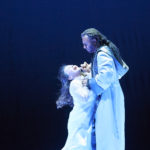 You see a great performance and you think it’s definitive. (That was Verdi’s Otello at Vienna State Opera in 2014, with Jose Cura, Dmitri Hvorostovski, and Anja Harteros). But with the same gloomy, minimalist set – Christine Mielitz’s production re-tweaked- a different cast offer an unexpectedly powerful experience, throwing new light on Verdi’s late masterpiece.
You see a great performance and you think it’s definitive. (That was Verdi’s Otello at Vienna State Opera in 2014, with Jose Cura, Dmitri Hvorostovski, and Anja Harteros). But with the same gloomy, minimalist set – Christine Mielitz’s production re-tweaked- a different cast offer an unexpectedly powerful experience, throwing new light on Verdi’s late masterpiece.
Roberto Alagna sings Otello, that golden tenor now more mellow, but Alagna enacts his characters, enters into a role physically, like a method actor. And, of course, he’s not black, but burnished ; as there are surely blonde, lighter-haired north Africans, Moors. ‘Race’ isn’t what Verdi’s Otello is about: rather envy, avarice (Jago’s), and obsessive jealousy (Otello’s). Otello, returning from victory, appears passionately in love with Desdemona, sung by soprano Alexandra Kurzak, in a triumphant debut. Her love duets with Alagna are passionate, physical and convincing, ( as in Già nella notte densa.)
So Jago exploits Otello’s most treasurable and humanly vulnerable asset to wreak his revenge on Otello. (He’s been passed over for promotion in favour of Cassio: a case of power-thwarted ambition.)
 Dalibor Jenis’s Jago is, physically, unexpected: not Shakespeare’s subtle ‘lean and hungry’ plotter you’d imagined. Jenis, in black leather, is a big man not to be messed with. Jenis, endowed with a superbly timbered baritone, seems to dominate the first Acts. Firstly, after the boogieing shindig welcoming Otello home – Esultate, super chorus! – he stirs up Roderigo (Leonardo Navarro) against Cassio (Antonio Poli’s tenor especially beautifully sung). He gets his rival Cassio so drunk and disorderly that Otello intervenes, and demotes him.
Dalibor Jenis’s Jago is, physically, unexpected: not Shakespeare’s subtle ‘lean and hungry’ plotter you’d imagined. Jenis, in black leather, is a big man not to be messed with. Jenis, endowed with a superbly timbered baritone, seems to dominate the first Acts. Firstly, after the boogieing shindig welcoming Otello home – Esultate, super chorus! – he stirs up Roderigo (Leonardo Navarro) against Cassio (Antonio Poli’s tenor especially beautifully sung). He gets his rival Cassio so drunk and disorderly that Otello intervenes, and demotes him.
Now Jago’s scheming works on Cassio, suggesting he get Desdemona to intercede with Otello on his behalf; and thus plant the seeds of Otello’s mistrust. The word of a woman is not to be trusted, he sings to Cassio.
Although he defers to the Moor, he hates and abhors him. ‘If I were the Moor, I would be on my guard.’ Yes, there is a hint of racism. A sensational Jago – if not the sophistry and guile of Hvorostovsky’s I was privileged to hear. But Jago’s highlight aria is viscerally exciting, Jenis’s vocal power supple, world-experienced, with a tremendous register. In Jago’s Credo in un Dio crudel , he proclaims his defiance of fate. He believes in a cruel God who created him from his own image. Man is the plaything of an evil fate. And after so much misery comes death. And then… Death is a void. Boito’s libretto actually develops a Shakespeare-like soliloquy, Verdi’s score does the rest. (In the late operas, Verdi’s ever more skillful orchestral scoring sounds surprisingly modern.)
Jago’s conspiracy unfolds, Satan-like, poisoning their love. Playing on Desdemona’s naive gullibility- innocently ‘protecting’ Casio, while fueling Otello’s jealousy- Otello a soldier, remember, inexperienced in social intrigues: ‘savage passion beneath a veneer of Mediterranean civility.’ Hence (in Act 2), caught in Jago’s web, Desdemona (Kurzak) begs her husband to forgive Cassio, while Otello keeps insisting on seeing the handkerchief, which she’s ‘lost’. (In fact, Jago’s stolen it from Desdemona’s maid, and planted it on Cassio to insinuate Desdemona’s infidelity.)
Alagna’s Otello falls into a rage. Alagna is masterful in suggesting how obsession – first over petty things- leads insidiously into madness. The handkerchief (from his mother) has special powers, he sings to her; threatening if she loses it, it could omen very bad luck.
Then Jago further intrigues for Otello to listen in on a staged conversation between Cassio and himself: incriminating fragments, in which Cassio enthuses over his own mistress; and with Cassio all the while holding up the handkerchief he’d inadvertently found.
So by the time the Venetian ambassador arrives, Otello is losing his mind. The scene, on a multi-leveled extended stage, is spectacular, although the set is minimal. Lodovico (Alexandra Mossau), greeting Otello, has come to recall him to Venice. And to appoint Cassio- who Otello demoted – in his stead. (There’s wonderful Verdian ensemble singing – the Chorus, Venetian envoys, Desdemona and Otello – all singing on different levels.)
Now, again, Desdemona tragically intercedes for Cassio. Otello pushes her to the floor. He just loses it. Alagna, who has to be the most physical of Otellos, falls back and collapses onto the stage. Surely dangerous. The envoy Lodovico is horrified, and comforts the abused wife.
Desdemona senses the worst, and summons her maid Emilia (Ilseyar Khayrullova) to prepare her. And sings the ‘Willow Song’, sung by her mother’s maid Barbara after her man had left her. After hearing Harteros, and Kristine Opolais (both wonderful in their way), Alexandra Kurzak, new to the role, was yet a revelation. Her heart-felt rendering stunned the audience into near-complete silence. Sung with consummate, unaffected artistry and irradiating humanity. Then, she kneels to sing Ave Maria, pleading to the Virgin Mary. Kurzak’s extended aria, beautifully and sensitively accompanied by Vienna State Opera Orchestra under Graeme Jenkins, was very special. After such a cri-de-coeur, applause seemed inappropriate. So Jenkins wisely moves on: menacing choppy chords, double basses, forbode the storm.
This, Verdi’s Desdemona, may appear just too innocent- but she’s saintly. Too good for the real world. Pure virtue -born under an evil sign, so Otello later describes her. We see Kurzak, huddled, in brilliant white- a crumpled heap of humanity- beneath the enormous ‘bed’ (covered in some kind of tarpaulin, like a boxing ring), dominating the stage. Alagna, whose Otello is at the very extreme, out of control, taunts her, misinterpreting her religious devotion as misplaced guilt for her infidelity; still certain of her adultery with Cassio. Dio! mi poteri scagliar. Did it please heaven to try him with affliction. Verdi’s Otello – foul-mouthed, calling her whore- is far from the more taciturn Othello of Shakespeare. But this is red-blooded (19th century) Romantic Italian opera.
 Alagna, in a hooded gold iridescent parka- like an angel of death- strangles her. Cast as you were in life; ascended to heaven. Then, realising his dastardly deed, sings, tries to kiss her: A kiss, one more kiss. The truth will out, Emilia her maid tells of how Jago bullied her for the handkerchief, revealing the scale of the intrigue; and of Otello’s tragedy. She’s now ‘lying in the darkness in which I sail’ – the blackness of his mental breakdown. Alagna reaches for his sword- the act physically explicit- to salvage him some honour. Nun mi terma .
Alagna, in a hooded gold iridescent parka- like an angel of death- strangles her. Cast as you were in life; ascended to heaven. Then, realising his dastardly deed, sings, tries to kiss her: A kiss, one more kiss. The truth will out, Emilia her maid tells of how Jago bullied her for the handkerchief, revealing the scale of the intrigue; and of Otello’s tragedy. She’s now ‘lying in the darkness in which I sail’ – the blackness of his mental breakdown. Alagna reaches for his sword- the act physically explicit- to salvage him some honour. Nun mi terma .
Tremendous singing from Vienna State Opera Chorus throughout; now including children from Vienna State Opera School in ghostly hoods rear stage. There are some incomprehensibly weird effects in Christian Floeren’s stage set in Mielitz’s production. Nevertheless the use of cages to suggest the claustrophobia of Otello’s mental torment is simplistic, but effective.
Altogether a performance to treasure of Otello, the pinnacle of Verdi’s art, and, arguably, the tradition of Italian opera.© PR. 12.03.2018
Photos: Alexandra Kurzak (Desdemona), Roberto Alagna (Otello); Dalibor Jenis (Jago); Alexandra Kurzak (Desdemona); Roberto Alagna and Alexandra Kurzak; Featured Image: Dalibor Jenis (Jago)
© Wiener Staatsoper/ Michael Pöhn
